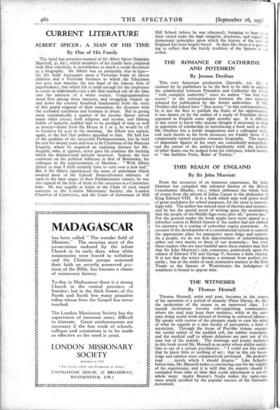CURRENT LITERATURE
The brief but attractive memoir of Sir Albert Spicer (Simpkin Marshall, 3i:.6a.), which members of his family-halie prepared With filial solicitude, is nevertheless as much a social document as a biography. Sir Albert was so eminently, true to tyPe- his life built foursquare upon a Victorian home of eleven children and a Victorian business to which the Education Act gave new impetus (he was head of the famous firm of papermakers), but which left it small enough for the employees to .count as individnalsyet -a life 'that reached out all the time into the interests of a wider society. Congregationalism stood first among those interests, and struggling chapels up and down the country benefited handsomely from the visits of this grand seigneur of their connexion, the dissenter with the cockaded coachmen and footmen in livery. But in giving away systematically a quarter of his income Spicer served many other causes, both religious and secular, and lifelong habits of industry enabled him to be prodigal of time -as well as money—home from the House at 2 or 3, he would be off to business by 9.30 in the morning. Sir Albert was typical, again, in the fact that politics appealed to him. He had few of the qualities of the successful Parliamentarian, but he held his seat for twenty years and rose to be Chairman of the Marconi Enquiry, where he acquired an enduring distrust for Mr. Asquith, who, it appears, never gave his nominee the backing which his disinterested attitude deserved. Indeed, the best comment on his political influence is that of Bottomley, his colleague in the representation of Hackney : "With Albert Spicer so near I shall certainly have to turn over -a new leaf." But if Sir Albert experienced the sense of anticlimax Which awaited most of the Liberal Nonconformist stalwarts of 1906 in the later stages of their Parliamentary careers, he was also, typical of the best of them in his successes as a Committee man. He was equally at home in the Chair of such varied concerns as the London Missionary Society, the London Chamber of Commerce, and the Court of Governors of Mill Hill School (where he was bducated), bringing to bear uu )11 their varied tasks the high integrity, prudence, and regard lor democratic principles upon which the history of the sects in England has been largely based. In days like these it is gratify- ing to reflect that the family tradition of the Spicers is not ended.










































 Previous page
Previous page